Paralympic Swimmer Lawrence Sapp: Defying Expectations About IDD
From an early age, Lawrence Sapp found his calling in swimming. His parents enrolled him on a summer swim team at just 5 years old, hoping it would help their son find his voice and a life-saving skill. Little did they know, swimming would become Lawrence’s passion and lead him to incredible heights.
Lawrence started competitive swimming at age 12 and hasn’t looked back. Now 22, Lawrence is a student and NCAA Division 2 swimmer at the University of Missouri–St. Louis. He’s also a trailblazing Paralympic athlete, shattering stigmas about what’s possible for people with autism and intellectual disabilities. In 2020, Lawrence made history as the first male Paralympic swimmer with autism and an intellectual disability to join the Team USA National A team. At the Tokyo 2020 Paralympic Games, he placed 5th in the 100m butterfly, 12th in the 200m individual medley, and 14th in the 100m backstroke. As he shared, “I was proud that I could represent my country in a sport that I love.” Lawrence will also be competing with Team USA for the 2024 Paris Paralympics in August and already has his sights set on Los Angeles 2028.
The path was not easy at first, as Lawrence struggled to find high-level training tailored for swimmers with intellectual disabilities. So, Lawrence sought out coaches open to learning and adapting alongside him. The tools they developed for Lawrence’s success, like writing out sets on a whiteboard, ended up benefiting many swimmers because accommodations can lift up entire teams, not just individuals with disabilities. The coaches credit Lawrence with helping them cultivate more patience and compassion and becoming better coaches overall.
“I had to learn to be more patient while they figured things out,” Lawrence shared. “I also learned how to speak up when I felt that I wasn’t getting what I needed. My USA Swimming coaches were also very supportive.”
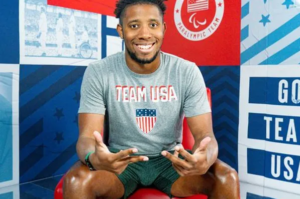 That perseverance continues to propel Lawrence to chase his dreams, powering him through twice daily swim sessions plus lifting when he’s at school and daily 4:30 am swims during breaks. “I have goals that I want to reach, and I just focus on my goals and what I need to do to achieve those goals,” he says of how he stays focused. His pre-meet routine of eating sandwiches and spaghetti helps him fuel up.
That perseverance continues to propel Lawrence to chase his dreams, powering him through twice daily swim sessions plus lifting when he’s at school and daily 4:30 am swims during breaks. “I have goals that I want to reach, and I just focus on my goals and what I need to do to achieve those goals,” he says of how he stays focused. His pre-meet routine of eating sandwiches and spaghetti helps him fuel up.
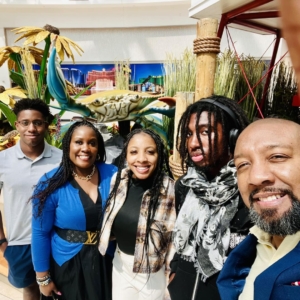 Beyond the pool, Lawrence hopes his story will shatter misconceptions about people with disabilities and their potential. “They think that we are happy with letting people do things for us and telling us what to do,” he says of societal attitudes toward autism and intellectual disabilities. “They don’t think that we are capable of making decisions for ourselves and can do things independently.” Lawrence also plans to “graduate from college in 2025, get a job doing something I love, and one day have my own home.”
Beyond the pool, Lawrence hopes his story will shatter misconceptions about people with disabilities and their potential. “They think that we are happy with letting people do things for us and telling us what to do,” he says of societal attitudes toward autism and intellectual disabilities. “They don’t think that we are capable of making decisions for ourselves and can do things independently.” Lawrence also plans to “graduate from college in 2025, get a job doing something I love, and one day have my own home.”
To others with disabilities pursuing big dreams, Lawrence’s message is one of empowerment: “I would tell them not to give up. Talk to people that can help you and don’t let people trick you into doing something else. You can do anything you want to do.”
With an impressive roster of World Championships experience and medals—including 2 golds and 1 silver in butterfly and backstroke events from 2017-2023—it seems there’s no limit to how far Lawrence’s perseverance can take him.
“My dream is to make the Team USA team…and show people what people with autism and intellectual disabilities can do if you support us and include us,” he said. “We are always told what we can’t do but people with disabilities need to be shown what they can do.”
Lawrence is doing just that—and so much more.


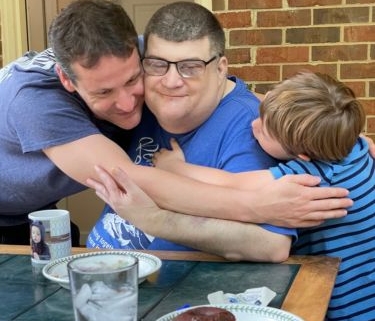
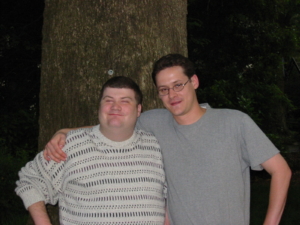 Family is at the heart of Burt Hudson’s connection to The Arc.
Family is at the heart of Burt Hudson’s connection to The Arc.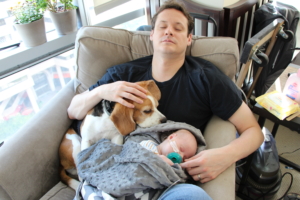 Jack is now 9 years old and—despite a speech delay from childhood apraxia of speech—he is a complex, smart, and kind third grader. He loves riding horses, dancing to Bruno Mars and Maroon 5, drumming, and acting out Muppets movies. He also has a 6-year-old younger brother, James, and “They have been a duo ever since James was born.” Burt recalls a memory from his childhood when he and his brother were wrestling in the ocean, showing John was just another sibling. The same camaraderie is seen between Jack and James.
Jack is now 9 years old and—despite a speech delay from childhood apraxia of speech—he is a complex, smart, and kind third grader. He loves riding horses, dancing to Bruno Mars and Maroon 5, drumming, and acting out Muppets movies. He also has a 6-year-old younger brother, James, and “They have been a duo ever since James was born.” Burt recalls a memory from his childhood when he and his brother were wrestling in the ocean, showing John was just another sibling. The same camaraderie is seen between Jack and James.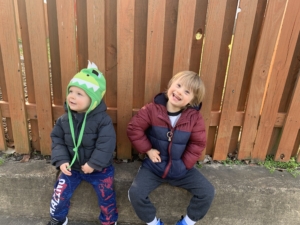
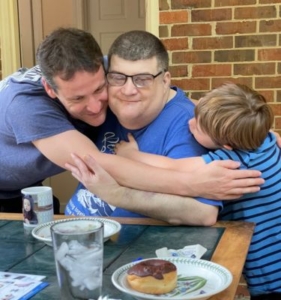 Burt wants people with disabilities and their loved ones to know they can always turn to The Arc for guidance. “The Arc is a wonderful resource full of wonderful people, one that generations of families have relied on to find the path they need to be walking.” As Treasurer of our national Board, Burt is heartened to see The Arc remain strong through the decades. “There’s a lack of compassion and a lack of love all around us, and The Arc is the heart of this country. It shows the strength we have when we’re banded together with a common cause and love for each other. The consistent light The Arc has provided gives me comfort and hope that we’ll get through anything.”
Burt wants people with disabilities and their loved ones to know they can always turn to The Arc for guidance. “The Arc is a wonderful resource full of wonderful people, one that generations of families have relied on to find the path they need to be walking.” As Treasurer of our national Board, Burt is heartened to see The Arc remain strong through the decades. “There’s a lack of compassion and a lack of love all around us, and The Arc is the heart of this country. It shows the strength we have when we’re banded together with a common cause and love for each other. The consistent light The Arc has provided gives me comfort and hope that we’ll get through anything.”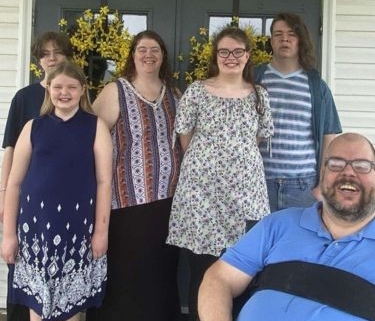
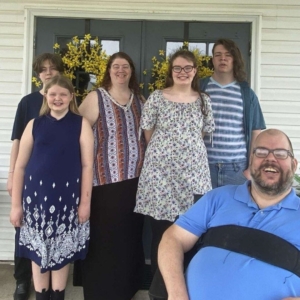 This Father’s Day, we’re celebrating Mike, a dad whose unconditional love and devotion are redefining society’s views on parenthood. Born with cerebral palsy, Mike has navigated life from a wheelchair, facing prejudices that often wrongly question the ability of those with disabilities to raise children.
This Father’s Day, we’re celebrating Mike, a dad whose unconditional love and devotion are redefining society’s views on parenthood. Born with cerebral palsy, Mike has navigated life from a wheelchair, facing prejudices that often wrongly question the ability of those with disabilities to raise children.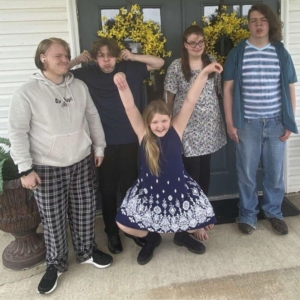 His disability has no impact on his ability to empower his children’s pursuit of interests and passions, from sports to church activities. He also teaches life skills and moral values to youth as a deacon and youth counselor at his church and a coach for Junior Church. His ultimate advice to other parents with disabilities? “God chose you to raise this child – you can do it! Keep working at it and don’t give up.” His oldest is already planning for his future, with his sights set on graphics design or counseling.
His disability has no impact on his ability to empower his children’s pursuit of interests and passions, from sports to church activities. He also teaches life skills and moral values to youth as a deacon and youth counselor at his church and a coach for Junior Church. His ultimate advice to other parents with disabilities? “God chose you to raise this child – you can do it! Keep working at it and don’t give up.” His oldest is already planning for his future, with his sights set on graphics design or counseling.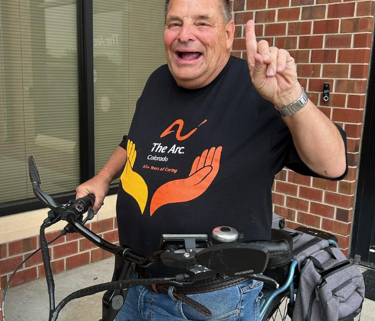
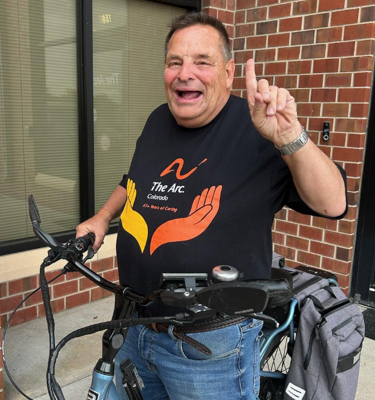 Kris lives with his sister’s family in his hometown of Greely, Colorado, and has been successfully employed for 40 years, currently working full time at the busiest grocery store in town. He is an avid sports fan—Go Bears!—has a busy social life, and because of his gregarious personality he is a bit of a local celebrity, traveling around town on his e-bike. Kris has become very active in civic service—involved with the Chamber of Commerce, volunteering at local nonprofits, and serving in leadership roles at both The Arc of Weld County and on The Arc’s National Council of Self-Advocates.
Kris lives with his sister’s family in his hometown of Greely, Colorado, and has been successfully employed for 40 years, currently working full time at the busiest grocery store in town. He is an avid sports fan—Go Bears!—has a busy social life, and because of his gregarious personality he is a bit of a local celebrity, traveling around town on his e-bike. Kris has become very active in civic service—involved with the Chamber of Commerce, volunteering at local nonprofits, and serving in leadership roles at both The Arc of Weld County and on The Arc’s National Council of Self-Advocates.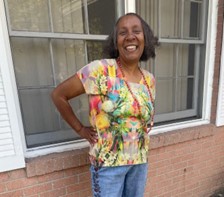 Roselyn has lived with her mother and received support from The Arc of Greater Indianapolis since 1981. During the week, Roselyn works at Corteva Agriscience through The Arc of Greater Indianapolis’ employment services. She works as part of a team that assists scientists in preparing seedling trays for growing new plants, hosing down trays when experiments are complete, and keeping the greenhouse labs clean. Roselyn is very proud of her work and the independence she has from earning a paycheck. She recently bought a kitchen table set and used her tax check to buy a new washer and dryer.
Roselyn has lived with her mother and received support from The Arc of Greater Indianapolis since 1981. During the week, Roselyn works at Corteva Agriscience through The Arc of Greater Indianapolis’ employment services. She works as part of a team that assists scientists in preparing seedling trays for growing new plants, hosing down trays when experiments are complete, and keeping the greenhouse labs clean. Roselyn is very proud of her work and the independence she has from earning a paycheck. She recently bought a kitchen table set and used her tax check to buy a new washer and dryer.
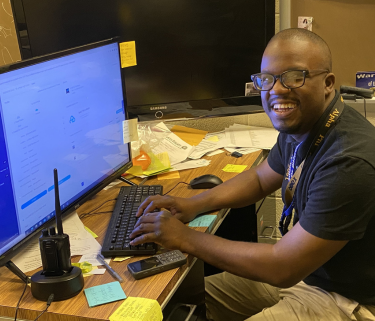
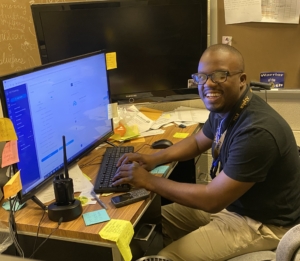 Tayone Miller is a full-time Computer Analyst with Charles County Public Schools (CCPS), bringing nearly a decade of experience in developing, managing, and improving information technology. It’s a career he’s always dreamed of. “Technology helps people throughout their lives,” he shares. “I wanted a career that would be everlasting, and Computer Information Systems (CIS) was the right fit for me.”
Tayone Miller is a full-time Computer Analyst with Charles County Public Schools (CCPS), bringing nearly a decade of experience in developing, managing, and improving information technology. It’s a career he’s always dreamed of. “Technology helps people throughout their lives,” he shares. “I wanted a career that would be everlasting, and Computer Information Systems (CIS) was the right fit for me.”





